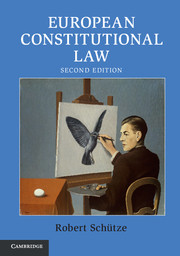Book contents
- Frontmatter
- Dedication
- Summary Contents
- Contents
- List of Illustrations
- List of Tables
- List of Cases
- List of Secondary Law
- Table of Equivalents
- List of Abbreviations
- Acknowledgements
- Introduction: European Constitutional Law
- Part I Constitutional Foundations
- Part II Governmental Powers
- 7 Legislative Powers: Competences and Procedures
- 8 External Powers: Competences and Procedures
- 9 Executive Powers: Competences and Procedures
- 10 Judicial Powers I: (Centralised) European Procedures
- 11 Judicial Powers II: (Decentralised) National Procedures
- 12 Judicial Powers III: EU Fundamental Rights
- Appendices
- Index
- References
12 - Judicial Powers III: EU Fundamental Rights
from Part II - Governmental Powers
- Frontmatter
- Dedication
- Summary Contents
- Contents
- List of Illustrations
- List of Tables
- List of Cases
- List of Secondary Law
- Table of Equivalents
- List of Abbreviations
- Acknowledgements
- Introduction: European Constitutional Law
- Part I Constitutional Foundations
- Part II Governmental Powers
- 7 Legislative Powers: Competences and Procedures
- 8 External Powers: Competences and Procedures
- 9 Executive Powers: Competences and Procedures
- 10 Judicial Powers I: (Centralised) European Procedures
- 11 Judicial Powers II: (Decentralised) National Procedures
- 12 Judicial Powers III: EU Fundamental Rights
- Appendices
- Index
- References
Summary
Introduction
The protection of human rights is a central task of many modern judiciaries. Judicial review may thereby be limited to the review of the executive; yet in its expansive form, it includes the judicial review of legislative acts. The European Union follows this second tradition. Fundamental rights thus set substantive – judicial – limits to all governmental powers and processes within the Union. They indeed constitute one of the most popular grounds of review in actions challenging the validity of European Union law.
What are the sources of human rights in the Union legal order? Despite the absence of a ‘bill of rights’ in the original Treaties, three sources for EU fundamental rights were subsequently developed. The European Court first began distilling fundamental rights from the constitutional traditions of the Member States. This unwritten bill of rights was inspired and informed by a second bill of rights: the European Convention on Human Rights. This external bill of rights was, decades later, matched by a written bill of rights specifically drafted for the European Union: the Charter of Fundamental Rights.
These three sources of EU fundamental rights are now expressly referred to – in reverse order – in Article 6 of the Treaty on European Union. The provision reads:
1. The Union recognises the rights, freedoms and principles set out in the Charter of Fundamental Rights of the European Union of 7 December 2000, as adopted at Strasbourg, on 12 December 2007, which shall have the same legal value as the Treaties …
2. The Union shall accede to the European Convention for the Protection of Human Rights and Fundamental Freedoms. Such accession shall not affect the Union's competences as defined in the Treaties.
3. Fundamental rights, as guaranteed by the European Convention for the Protection of Human Rights and Fundamental Freedoms and as they result from the constitutional traditions common to the Member States, shall constitute general principles of the Union's law.
This chapter investigates each of the Union's three bills of rights and the constitutional principles that govern them. Section 1 starts with the discovery of an ‘unwritten’ bill of rights in the form of general principles of European law. Section 2 analyses the Union's own ‘written’ bill of rights: the EU Charter of Fundamental Rights.
- Type
- Chapter
- Information
- European Constitutional Law , pp. 429 - 470Publisher: Cambridge University PressPrint publication year: 2015



